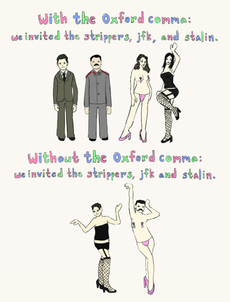Do you know how to remember when to use ‘I’ and when to use ‘me’ in a sentence? It seems a lot of people find this tricky (including our politicians), when in reality it is quite simple if you follow a rule that cuts out all the grammar jargon that scares most people (me included).
I is the first person singular subject pronoun, which means that it refers to the person performing the action of a verb, so you would say:
I fancy a piece of chocolate
not
Me fancy a piece of chocolate (unless you are a Minion - substitute banana; or the Cookie Monster - substitute cookie)
Me is an object pronoun, which means that it refers to the person that the action of a verb is being done to, or to whom a preposition refers, for instance:
She told Ellie and me to have a piece of chocolate
not
She told Ellie and I to have a piece of chocolate
The rule
The best way to work it out is to try out the sentence to see if you would use ‘me’ or ‘I’ if it were just you on your own:
Me is going out NO
I am going out YES
Therefore:
Charlotte and I are going out
He gave it to me YES
He gave it to I NO
Therefore:
He gave it to Charlotte and me
Not so hard after all ...
If you have any stories or comments, I’d love to hear them.
I is the first person singular subject pronoun, which means that it refers to the person performing the action of a verb, so you would say:
I fancy a piece of chocolate
not
Me fancy a piece of chocolate (unless you are a Minion - substitute banana; or the Cookie Monster - substitute cookie)
Me is an object pronoun, which means that it refers to the person that the action of a verb is being done to, or to whom a preposition refers, for instance:
She told Ellie and me to have a piece of chocolate
not
She told Ellie and I to have a piece of chocolate
The rule
The best way to work it out is to try out the sentence to see if you would use ‘me’ or ‘I’ if it were just you on your own:
Me is going out NO
I am going out YES
Therefore:
Charlotte and I are going out
He gave it to me YES
He gave it to I NO
Therefore:
He gave it to Charlotte and me
Not so hard after all ...
If you have any stories or comments, I’d love to hear them.




